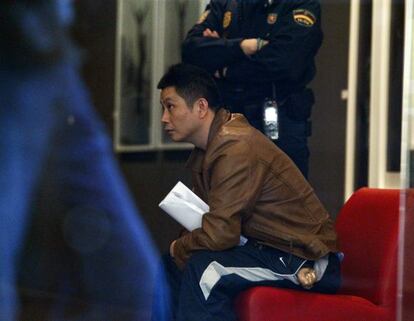Gao Ping: the emperor and his clothes
Despite his flashy attire, Madrid mansion and extensive art collections, authorities became interested in businessman through an empty bank account

Gao Ping loved Galician shellfish. When he held business meetings, he would visit a Galician restaurant in Madrid's Fuenlabrada suburb, where he would order expensive dishes and fine wines. "He always watched his pesetas, well, I mean euros. He would never come in with other Chinese; they were always Spaniards or foreigners. He was a friendly guy but you could tell he was a very powerful man. He was one of the owners of Cobo Calleja," said one person at the restaurant, referring to the industrial complex in Fuenlabrada that was the center of his wholesale import business operations.
Gao, who was arrested on Tuesday as part of an early morning nationwide sweep, is said to be the ringleader of one of the biggest money laundering operations ever seen in Spain. So far there have been 84 arrests, most of them Chinese nationals. They are accused of laundering up to 300 million euros a year.
Gao has been under the judicial spotlight on numerous occasions, but never charged with any crime. In 2010, anti-corruption investigators took an interest in Gao's operations and associates, including his wife, Lizhen Yang, his Spanish accountant, Pedro Guzmán Hernández, and Hai Bo, who had risen from bodyguard to right-hand man and who, authorities believe, acted as an enforcer for the enterprise through extortion, violence and the use of hired assassins. The High Court rejected the case on the grounds that "the inference of a genuine criminal organization is very weak." But an Organized Crime and Drugs task force had opened a separate investigation months earlier.
During Tuesday's raids police found some 5.3 million euros in cash in one of his warehouses. But Gao - who has been in Spain since 1989 - didn't just want to be another successful Chinese businessman; his real desire was to become a well-known art connoisseur and philanthropist.
Gao Ping was born in Qingtian City in Zhejiang province, where many Chinese migrants in Spain come from. He was known as Alberto to many here in Spain, and his dream was to establish a family of industrialists and philanthropists, much like the Guggenheims, who started out in imports and amassed a great fortune.
"The life of the Guggenheims is my dream. China is at its peak moment, it is now our turn and it is a perfect time to fulfill your dreams. In 10 to 20 years, we will have our own place in the sun," Gao told EL PAÍS in an 2008 interview from Beijing, where he opened his Center of Contemporary Iberian Art.
During that first exhibition, works by Chinese artists such as Ai Weiwei and Zao Bandi, and Spanish artists Isabel Muñoz and Ouka Lele, were put on display. "This center is the bridge between two countries," Gao said.
In February, Gao inaugurated his 700-square meter gallery, Magee, next to the Reina Sofía Museum in Madrid.
Gao's right-hand man is suspected of enforcing through hired assassins
"My intention is to display works by young Chinese artists in Spain, and in Beijing we want to bring in works from legendary Spanish artists such as Dalí. People know about China's economy but not its culture. And getting to know Chinese contemporary art is fundamental in understanding the country's transformation," he told EL PAÍS.
Dressed in a pin-stripe suit, with a pink polka-dot tie and sporting a gold and silver Rolex, Gao didn't look like a cultured western philanthropist. "If I don't become one, my children will, or even my grandchildren," he insisted.
Four years after Gao arrived in Spain, he began his import business in Madrid. The young businessman, who never completed his university studies, has numerous holdings in China, including a furniture manufacturer, which exports to the United States and Europe, and a three-star hotel in Hubei province.
The third of five children, Gao was in possession of vast wealth. He owns a palatial home in the exclusive Madrid suburb of Somosaguas where he lives with his wife, a daughter and two sons.
According to evidence presented before the High Court by anti-corruption prosecutors, Gao owned a collection of luxurious vehicles and operated more than 15 importing businesses. His conspiracy laundered between 200 and 300 million euros a year, according to authorities.
Gao reportedly had a complete monopoly on all the supplies to Chinese bargain stores across Spain which, according to the government, affected fair trade in the country. A lot of the items he imported were fake designer goods, including some products with the CE label illegally tagged on.
But despite Gao's vast wealth, authorities found that he had little tucked away in his bank accounts. Perversely, it was this detail that piqued the interest of the organized crime squad and led to Operation Emperor, one of the biggest police swoops of its kind.
Tu suscripción se está usando en otro dispositivo
¿Quieres añadir otro usuario a tu suscripción?
Si continúas leyendo en este dispositivo, no se podrá leer en el otro.
FlechaTu suscripción se está usando en otro dispositivo y solo puedes acceder a EL PAÍS desde un dispositivo a la vez.
Si quieres compartir tu cuenta, cambia tu suscripción a la modalidad Premium, así podrás añadir otro usuario. Cada uno accederá con su propia cuenta de email, lo que os permitirá personalizar vuestra experiencia en EL PAÍS.
¿Tienes una suscripción de empresa? Accede aquí para contratar más cuentas.
En el caso de no saber quién está usando tu cuenta, te recomendamos cambiar tu contraseña aquí.
Si decides continuar compartiendo tu cuenta, este mensaje se mostrará en tu dispositivo y en el de la otra persona que está usando tu cuenta de forma indefinida, afectando a tu experiencia de lectura. Puedes consultar aquí los términos y condiciones de la suscripción digital.








































